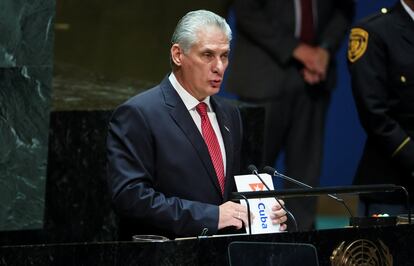Former world leaders ask Biden to remove Cuba from list of state sponsors of terrorism
The signatories of a letter addressed to Joe Biden include ex-presidents and prime ministers from Latin America, Europe, Africa, and Asia, who call the situation ‘a coercive measure difficult to justify in the 21st century’

Dozens of former presidents and prime ministers from around the world have signed a letter in which they convey to U.S. President Joe Biden, a few months before the end of his term, a request made by others in the past: to remove Cuba from the list of state sponsors of terrorism in which it was included under Donald Trump, reversing Barack Obama’s attempt to remove it from this list as part of the restoration of diplomatic relations in 2015. According to the signatories, which include former Colombian president Ernesto Samper, Brazil’s Dilma Rousseff, Argentina’s Cristina Fernández de Kirchner, Spain’s José Luis Rodríguez Zapatero, Bolivia’s Evo Morales and Ecuador’s Rafael Correa, naming Cuba as a country that sponsors terrorism is not only “a coercive measure that is difficult to justify in the 21st century,” but it has also contributed to the unparalleled economic crisis that the country is going through and the subsequent exodus, which already far exceeds the sum of previous waves of migration.
In the letter, which EL PAÍS had seen, the signatories state that the reasons for requesting that Cuba be permanently removed from the list “are based on a strong humanitarian appeal that seeks to alleviate the situation of millions of innocent people.” Another argument is the “deep conviction that the Cuban government is seriously committed to fighting terrorism and in favor of peace in the region and the world.”
The letter insists that “this unjust decision” impacts “the most vulnerable sectors of the Cuban population, which have been hit recently by the harmful effects of the pandemic, aggravated by the lack of medicines and equipment to deal with the emergency.” It also places particular emphasis on the economic crisis that the country is going through, “one of the worst hit in the world,” which is now “at a point of difficult return.” The letter says that after “decades of unilateral sanctions and coercive measures, Cuba’s economy is one of the most severely affected in the world and is currently, socially, at a point of difficult return.” According to economists, the government of Miguel Díaz-Canel has, in any case, responsibility to bear for the Cuban economic debacle.
The signatories affirm that the fact that the United States and Cuba have “political systems with different ideological inspirations” should not be a reason to deprive the island of mutual cooperation, and that although this year the State Department removed Cuba from the list of states that do not cooperate in the fight against terrorism, it paradoxically maintains it on the list of sponsoring countries, leading to the question: “How can one simultaneously claim that a country does cooperate in the global fight against terrorism and at the same time accuse it of openly supporting it?”
Cuba and the paradox of its support for terrorism
In May of this year, the State Department removed Cuba from the list of countries that do not cooperate in the fight against terrorism, but Cuban authorities have repeatedly condemned the inclusion of Cuba in another list of countries that do support terrorism, the so-called SSOT list, which also includes North Korea, Iran and Syria. According to the State Department itself, these governments “support international terrorism either by participating in terrorist activities themselves or by providing weapons, training, shelter, diplomatic facilities, financial support, logistical and/or other support to terrorists.”
It was in 1982, during the Ronald Reagan administration, that Cuba began to show up on the controversial list for supporting armed movements in Latin America and Africa. Later, other reasons included its relations with countries such as Iran and North Korea, or the fact that the country had given asylum to members of the Basque terrorist group ETA, as well as fugitives from American justice such as Joanne Deborah Chesimard (better known as Assata Shakur, a member of the Black Panther Party and Black Liberation Army) and Charlie Hill, accused of killing a police officer and hijacking an airliner to Havana.
After 33 years, in 2015 former President Barack Obama decided to remove Cuba from the list of countries sponsoring terrorism as part of the reestablishment of diplomatic relations between the two countries. In January 2021, with Trump in power, the island reappeared on the list under the arguments that the Cuban government maintains ties with groups such as the Revolutionary Armed Forces of Colombia (FARC) and the National Liberation Army (ELN), and that it refused to extradite 10 ELN leaders implicated in the 2019 attack on the police cadet school in Bogotá.
The letter, which was signed by other former leaders such as Peru’s Ollanta Moisés Humala Tass, Guatemala’s Vinicio Cerezo, Honduras’ Manuel Zelaya, Serbia’s Tomislav Nikolić and Malaysia’s Mahathir Mohamad, maintains that the Cuban government played an active role in the construction of the Peace Accords signed in Havana in 2016 between the State of Colombia and the FARC, and they highlighted its role in the dialogue for peace between the Colombian State and the ELN.
Although some thought that under Biden the sanctions imposed by Trump would be reversed, the truth is that the Democrat’s policy towards Cuba has been slow and not on his agenda of priorities. In the political arena, a part of the Republican wing advocates for more sanctions to suffocate the Cuban government, despite the fact that the embargo directly and in a real way affects ordinary Cubans. The inclusion of Cuba in the list of countries that support terrorism not only prevents international transactions, bans exports and imposes financial restrictions; it also makes it impossible to assist the country with humanitarian aid, affects Cuban citizens with dual nationality who want to travel to the United States with an ESTA permit, interferes with banking transactions and restricts academic exchanges.
Sign up for our weekly newsletter to get more English-language news coverage from EL PAÍS USA Edition
Tu suscripción se está usando en otro dispositivo
¿Quieres añadir otro usuario a tu suscripción?
Si continúas leyendo en este dispositivo, no se podrá leer en el otro.
FlechaTu suscripción se está usando en otro dispositivo y solo puedes acceder a EL PAÍS desde un dispositivo a la vez.
Si quieres compartir tu cuenta, cambia tu suscripción a la modalidad Premium, así podrás añadir otro usuario. Cada uno accederá con su propia cuenta de email, lo que os permitirá personalizar vuestra experiencia en EL PAÍS.
¿Tienes una suscripción de empresa? Accede aquí para contratar más cuentas.
En el caso de no saber quién está usando tu cuenta, te recomendamos cambiar tu contraseña aquí.
Si decides continuar compartiendo tu cuenta, este mensaje se mostrará en tu dispositivo y en el de la otra persona que está usando tu cuenta de forma indefinida, afectando a tu experiencia de lectura. Puedes consultar aquí los términos y condiciones de la suscripción digital.









































